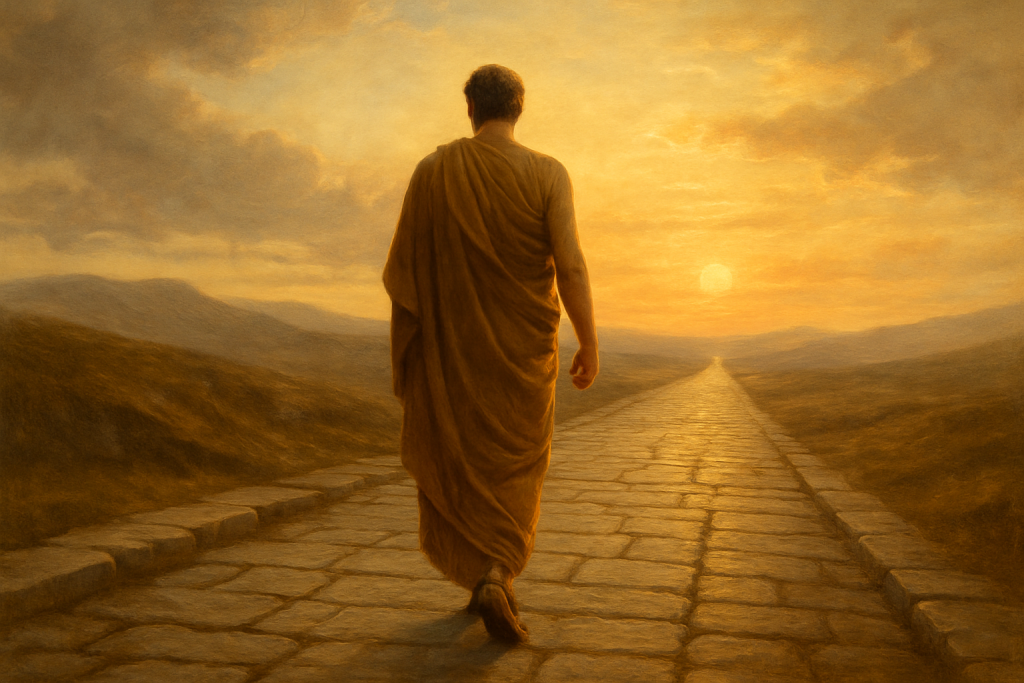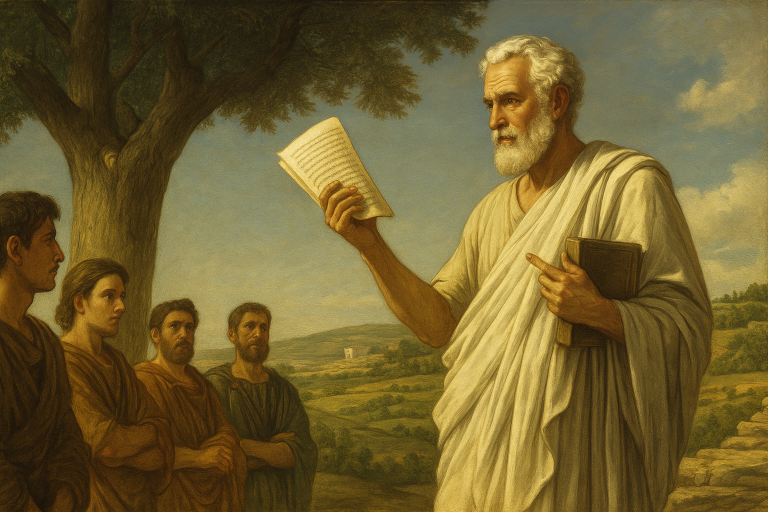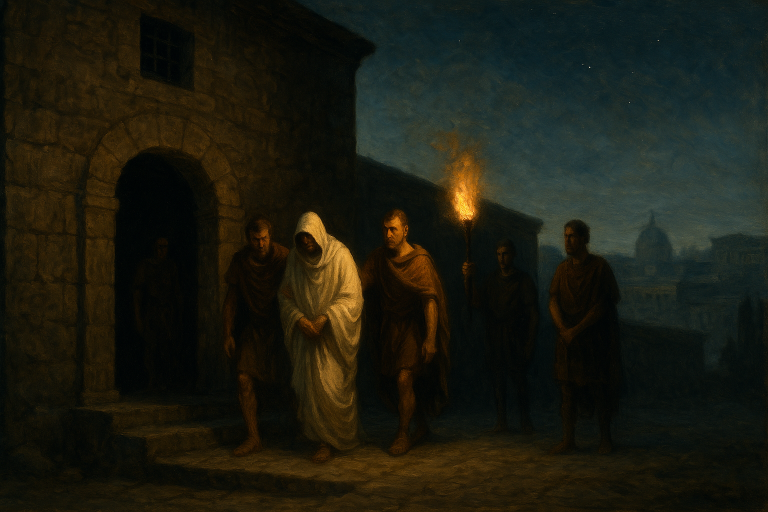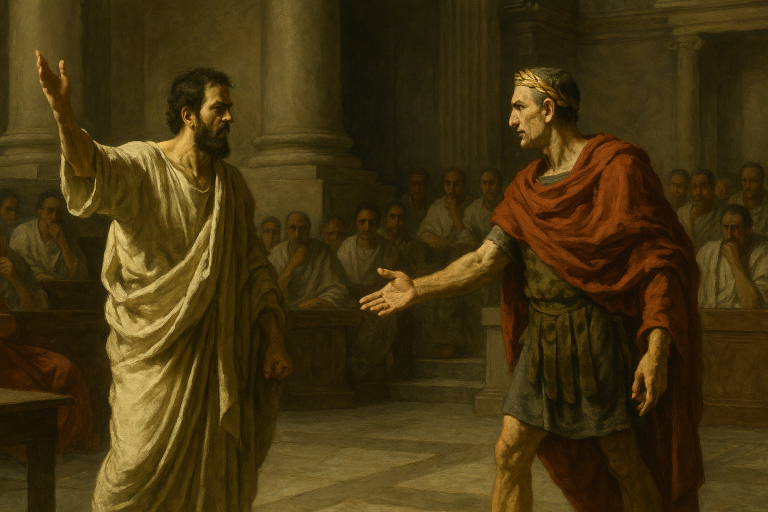Stoicism and Modern Life · Ancient Wisdom for a Better Way to Live

Modern life feels busy, but it is a shallow kind of busy. We fill our days with scrolling, with comfort, with noise, but none of it really tells us how to live. The pace is frantic, yet the substance is thin. When the notifications stop buzzing, the quiet that follows feels almost heavier than the noise itself.
Distraction has become our default. We chase news cycles, binge another show, check headlines about politics and culture wars. All of it feels urgent in the moment, but it rarely answers the deeper question we are all circling. How should I live?
That is the real crisis. Not that we argue too much about politics, but that we have lost the thread of philosophy. We have traded wisdom for ideology, and the result is drift. We move without direction. We want peace, purpose, and strength, but we reach for things that leave us emptier than before.
What Happens Without a Compass
When there is no inner compass, life begins to unravel in quiet but dangerous ways. Some collapse into despair, numbing themselves with whatever dulls the ache for a little while. Others turn their frustration outward, blaming society, their circumstances, or the people around them for everything that has gone wrong. Many more simply sink into endless consumption, keeping themselves distracted with food, drink, entertainment, or work that never feels like enough. The symptoms look different, but the root is the same. A life without direction always drifts toward collapse.
The problem is not a lack of solutions. Quick fixes are everywhere. We can sign up for courses, scroll motivational reels, or buy the latest gadget that promises to make us happy. And for a moment, these things might ease the discomfort. But none of them touch the deeper emptiness that comes from living without a guiding philosophy. The more we chase outside answers, the more hollow we feel inside.
Without philosophy, life turns reactive instead of deliberate. We lurch from one crisis to another, always responding but never steering. When we don’t know what we believe about the good life, we default to whatever the culture around us happens to be shouting the loudest. We let the algorithms, the advertisers, and the politicians decide what matters for us. And in the process, we lose the strength to decide for ourselves.
Philosophy is not an abstract hobby in times like these. It is the difference between being carried along by every current and choosing a course worth rowing toward. Without it, we are vulnerable to despair, resentment, and indulgence. With it, we can begin to live with steadiness and intention.
Not Politics but Philosophy
When life feels unstable, it is tempting to run to politics for answers. Every headline screams that the future depends on who wins the next election, which party controls the levers of power, or what ideology is on the rise. But if politics were enough to give us strength, we would not see so many people still restless and bitter even when their side wins.
Politics can shape laws and policies, but it cannot teach you how to get out of bed when grief pins you down. It cannot give you patience with a difficult child or help you face your own mortality. It cannot show you how to endure betrayal without becoming bitter, or how to meet success without becoming arrogant. These are not political questions. They are human questions.
The mistake is to think the crisis of modern life is left versus right, conservative versus progressive. The real issue is deeper. It is the absence of an ethos, a shared framework of meaning that tells us how to live well as human beings. Without that, politics becomes a substitute for philosophy. We look to ideology to give us the grounding that philosophy once gave, and the result is endless division, outrage, and shallow answers to questions that demand depth.
What is needed is not another partisan slogan or ideological movement, but a return to philosophy as a way of life. A philosophy that speaks to the human condition, not just to policy debates. One that teaches resilience, self-command, and integrity no matter who is in power or what the headlines say. Politics may rule nations, but philosophy rules the soul. And without it, even victory feels empty.
Stoicism as the Answer
Politics can shape laws but not the soul. Ideology can rally crowds but rarely gives an individual a clear way to live. That gap is where philosophy matters. The Romans discovered this in a time of assassinations, civil wars, and corruption. They could not count on peace or stability, so they needed a discipline strong enough to hold the mind steady when the world refused to cooperate.
Stoicism offered that discipline. It was never about grand theories or abstract speculation. It was a way of life. It asked for responsibility, resilience, and self-control. It demanded that a man look to his own character before blaming fortune or circumstance. It did not promise that suffering would vanish, only that he could meet it without being broken.
At its center was a simple claim. Virtue is the only true good. Wealth, power, and health rise and fall. Life itself is uncertain. What matters is not how long you live or what you gain, but how you choose to act. Wisdom, justice, courage, and temperance are the measures of a life well lived, no matter the outcome.
This is why Stoicism could guide such different men. Marcus Aurelius carried it with him on campaign. Seneca returned to it when caught in the intrigues of court. Epictetus built his teaching on it after enduring slavery. Each faced trials that looked very different, yet the same framework held firm.
Stoicism does not soften life. It steels you to face it. It is not an escape but a preparation. And for those who feel lost in the noise of modern life, it still offers a path toward clarity and strength.
The Four Virtues as Framework
The Romans knew that vague advice about being a “good person” was not enough. They wanted a structure to measure themselves against, a framework that was simple enough to remember but demanding enough to shape a lifetime. Stoicism gave them that in the form of four virtues: wisdom, justice, courage, and temperance.
Wisdom is the starting point. It means seeing reality clearly, not as we wish it to be but as it is. To live with wisdom is to sort truth from illusion, to separate what is in our control from what is not, and to act with reason instead of impulse. It is the foundation that steadies everything else.
Justice follows. It is the recognition that life is not lived in isolation. To be just is to give each person their due, to act fairly, and to hold ourselves accountable for how we treat others. Justice ties philosophy to community. Without it, wisdom risks becoming arrogance.
Courage is the virtue most people admire but few practice consistently. It is not about seeking danger but meeting it without surrender. Courage steadies us in the face of loss, illness, fear, or conflict. It is the willingness to act rightly even when the cost is high.
Temperance is the quiet strength that holds the others together. It is restraint in the face of desire, moderation when excess tempts, calm when anger flares. Temperance trains us not to be ruled by appetite or emotion. It is what allows wisdom, justice, and courage to endure through daily life.
Together, these four virtues form the heart of Stoicism. They are not abstract ideals but practical measures. Anyone can ask at the end of a day: was I wise, was I just, was I courageous, was I temperate? The answers reveal not perfection but progress, and that progress is what makes a life worth living.
The Call to Live Differently
The problems of our age are not solved by slogans or by waiting for someone else to change the world. They are solved one person at a time, in the quiet choices that shape our character. Stoicism does not promise an easy life, but it offers a way to live one worth respecting.
The temptation today is to drift with the current. To spend hours scrolling, numbing ourselves with food, drink, or entertainment. To rage at headlines and feel powerless against the chaos of the times. But all of that leaves us weaker, not stronger. What the Stoics remind us is that strength is not given, it is built. It is forged through daily practice of discipline, clarity, and self-command.
Men and women alike do not need to be told they are broken or shamed into submission. What we need is a philosophy strong enough to carry the weight of real life. A way of living that holds us steady when fortune turns, when injustice cuts deep, when fear whispers in the dark. That is what Stoicism has always offered.
The four virtues are still waiting to be lived. Wisdom to see the world clearly. Justice to act with integrity. Courage to face what frightens us. Temperance to hold ourselves in check. These are not abstract ideas but tools for every day. They ask nothing more than our willingness to practice, and nothing less than our commitment to keep going when we fall short.
The Romans proved that philosophy can be more than theory. It can be the difference between collapse and composure. The same choice lies before us now. We cannot control the world, but we can decide how to live within it. That decision, repeated day after day, is what marks a Stoic.






